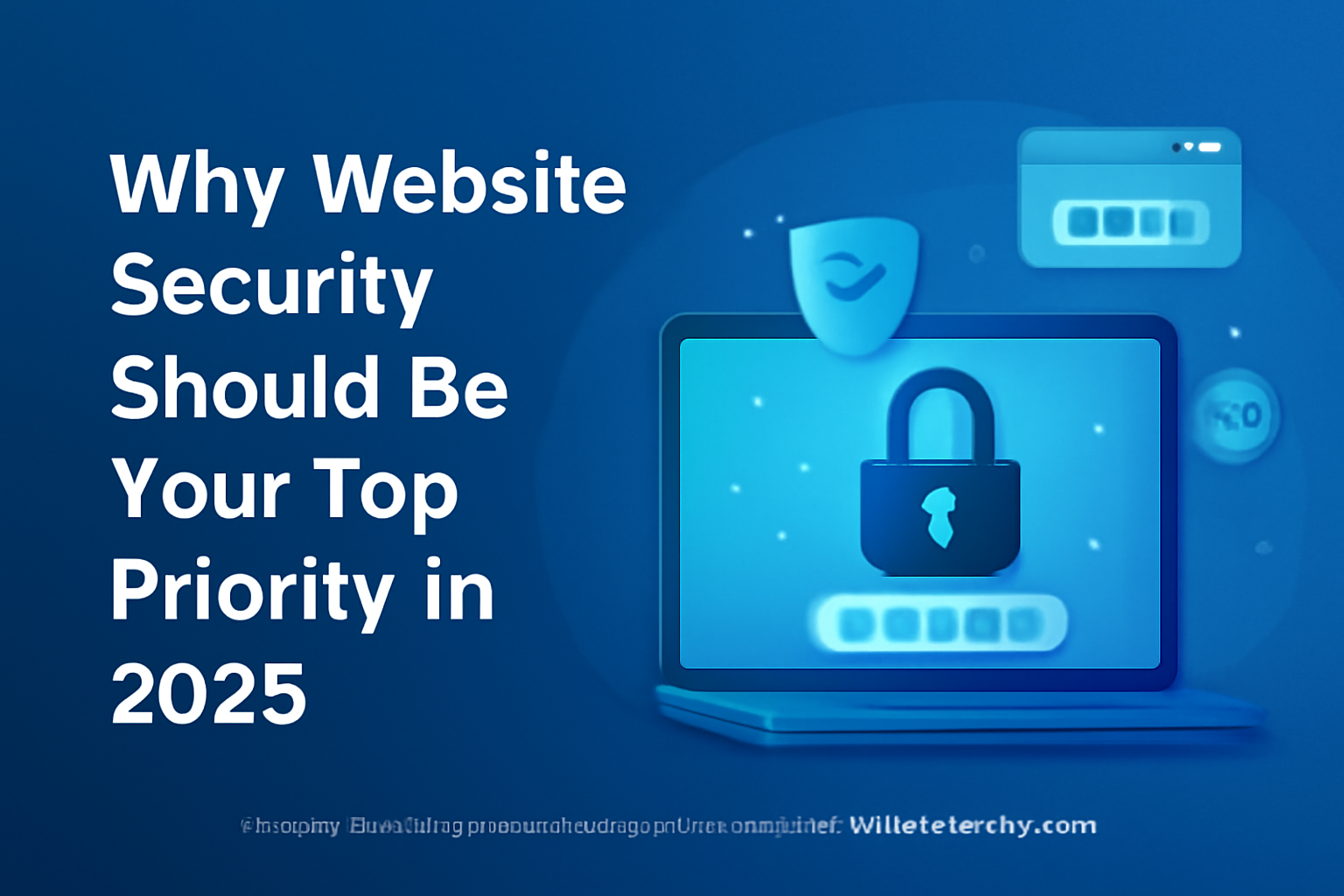Blog Details

Why Website Security Should Be Your Top Priority in 2025
Introduction
As we move into 2025, website security is no longer just an afterthought—it is an absolute necessity. With the increase in cyberattacks and data breaches, ensuring that your website is secure has never been more crucial. Hackers and cybercriminals are becoming increasingly sophisticated, targeting vulnerabilities that may not be obvious to the untrained eye. Whether it's protecting your customers' data or ensuring your website remains operational, a comprehensive security strategy is vital to safeguarding your online presence. This blog explores the importance of website security in 2025 and offers practical tips for protecting your site from evolving cyber threats.
Rising Cybersecurity Threats
In recent years, cybersecurity threats have become more advanced, with cybercriminals using cutting-edge tools and techniques to breach even the most secure websites. From ransomware attacks to phishing scams, the threats businesses face today are diverse and increasingly difficult to defend against.
Key Cybersecurity Threats in 2025:
- Ransomware: Attackers encrypt your website's data and demand payment in exchange for the decryption key.
- Phishing Attacks: Hackers use deceptive emails or websites to steal sensitive information, such as login credentials or credit card details.
- Malware Infections: Malicious software can be injected into your website to compromise its functionality, steal information, or infect visitors' devices.
Why it’s important:
- Cybercriminals are constantly evolving their methods, meaning businesses must adopt more sophisticated security measures to stay ahead.
- A single breach can cause significant damage to your reputation, lead to financial loss, and expose your users to harm.
The Importance of HTTPS and SSL
One of the simplest yet most powerful tools in securing your website is HTTPS (HyperText Transfer Protocol Secure). HTTPS encrypts the communication between your website and your visitors, ensuring that sensitive information—such as login credentials and payment details—is transmitted securely.
Why HTTPS and SSL Matter:
- Data Encryption: HTTPS ensures that all data exchanged between your website and visitors is encrypted, making it difficult for hackers to intercept.
- Trust and Credibility: Websites with HTTPS display a padlock icon in the address bar, signaling to users that their data is secure. This builds trust and encourages engagement.
- SEO Benefits: Google ranks websites with HTTPS higher than those without, making it an important factor in improving your search engine rankings.
What to Expect in 2025: As data privacy regulations become stricter, websites that do not implement HTTPS will be flagged by browsers like Chrome and Firefox, potentially harming user trust and SEO performance.
Two-Factor Authentication (2FA)
Two-factor authentication (2FA) is an added layer of security that requires users to verify their identity using two different methods before gaining access to their account. This can include something they know (like a password) and something they have (such as a mobile device or authentication app).
Why 2FA is Crucial:
- Enhanced Security: Even if a hacker obtains a user’s password, they will not be able to access the account without the second factor (e.g., a code sent to their phone).
- Protection Against Credential Stuffing: 2FA mitigates the risk of credential stuffing attacks, where hackers try using stolen passwords from other breaches.
What to Expect in 2025: As more companies implement 2FA, it will become the standard for all websites that handle sensitive user information, particularly in industries like finance, e-commerce, and healthcare.
Regular Security Audits
Conducting regular security audits is a critical step in maintaining a secure website. These audits help identify vulnerabilities, outdated software, and potential weaknesses that could be exploited by attackers.
Why Security Audits Are Important:
- Identifying Vulnerabilities: Audits help spot hidden vulnerabilities that might be overlooked in daily operations, such as outdated plugins or weak encryption protocols.
- Ensuring Compliance: Many industries have strict compliance standards regarding data security, such as GDPR and HIPAA. Regular audits help ensure your website meets these legal requirements.
- Proactive Security: Regular audits allow you to patch vulnerabilities before they become major problems, reducing the risk of a security breach.
What to Expect in 2025: Expect automated security auditing tools to become more advanced, making it easier for businesses to conduct continuous security monitoring and receive real-time alerts about potential threats.
Legal Compliance: GDPR and CCPA
As data privacy concerns grow, data protection regulations like the General Data Protection Regulation (GDPR) in the EU and the California Consumer Privacy Act (CCPA) in the US are becoming critical for businesses that handle personal data. Non-compliance with these regulations can lead to hefty fines and reputational damage.
Why Legal Compliance Matters:
- Consumer Trust: Adhering to privacy regulations shows your commitment to protecting customer data, building trust and credibility.
- Legal Repercussions: Failure to comply with data protection laws can result in substantial fines and legal action, which can significantly impact your business.
What to Expect in 2025: As privacy regulations become stricter, businesses will need to implement more robust security measures and data protection strategies. Expect to see more tools that help automate compliance efforts, particularly for GDPR and CCPA.
Conclusion
Investing in robust website security is essential for maintaining a trustworthy online presence. As cyber threats become more sophisticated, implementing best practices for website security—such as SSL encryption, two-factor authentication, regular security audits, and compliance with data protection regulations—will help protect your business, users, and data. In 2025, website security will no longer be optional; it will be a fundamental aspect of doing business online.
Call-to-Action
Is your website secure? Contact NexCodeForge today to learn how we can help you implement the latest security best practices and ensure that your website remains protected from emerging threats.
I appreciate the way you explained this topic. It cleared up a lot of confusion I had.
Pooja
Such an informative post! I’ll definitely be applying these tips.
Piyush
Loved reading this! You’ve presented the topic in a very engaging way.
Kritika

Leave a Reply
Your email address will not be published.